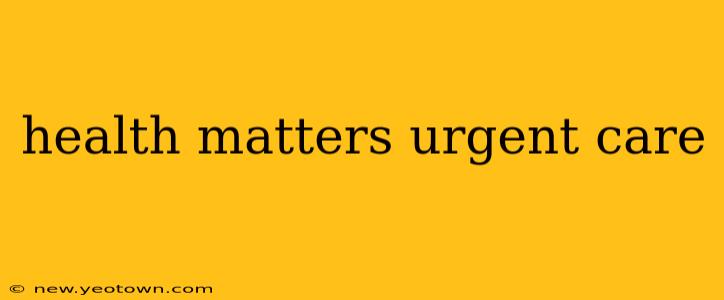Life throws curveballs. One minute you're perfectly fine, the next you're grappling with a sudden illness or injury. That's where urgent care steps in, bridging the gap between a minor ailment and a life-threatening emergency. But what exactly is urgent care, and when should you seek it out? This isn't your grandma's doctor's office; it's a fast-paced, efficient healthcare solution for a range of non-life-threatening medical needs. Let's delve into the world of urgent care and answer some pressing questions.
What is Urgent Care?
Imagine a healthcare setting that's quicker and more convenient than a traditional doctor's office, but not as overwhelming as an emergency room. That's urgent care. It's a walk-in clinic designed to handle non-life-threatening medical issues that require immediate attention but aren't severe enough for a hospital ER. Think of it as your go-to for unexpected health hiccups. From a nasty cut that needs stitches to a sudden bout of the flu, urgent care offers a timely and efficient solution. They typically have extended hours, including evenings and weekends, providing accessibility when your regular doctor might not be available.
What conditions are treated at urgent care?
Urgent care centers are equipped to handle a broad spectrum of conditions. These often include:
- Minor injuries: Cuts, sprains, bruises, minor burns, and simple fractures.
- Illnesses: Flu, strep throat, bronchitis, ear infections, urinary tract infections (UTIs), and sinus infections.
- Allergic reactions: Mild to moderate allergic reactions that aren't life-threatening.
- Other issues: Minor skin rashes, cold symptoms, and eye irritations.
It's important to note that while urgent care excels at addressing these, they are not equipped to handle serious medical emergencies like heart attacks, strokes, severe trauma, or major internal bleeding. In such cases, immediately go to the nearest emergency room.
When should I go to urgent care instead of the ER?
This is a crucial question. Here’s a simple guideline: If your condition is life-threatening or involves severe trauma, go straight to the emergency room. Urgent care is for situations that require prompt medical attention but are not immediately life-threatening.
Think of it this way:
- ER: Chest pain, severe bleeding, difficulty breathing, loss of consciousness, severe head injuries.
- Urgent Care: Minor cuts requiring stitches, a high fever, a bad cough, a sprained ankle.
What are the benefits of urgent care?
Urgent care offers several key advantages:
- Convenience: Extended hours and walk-in access make it incredibly convenient.
- Shorter wait times: Generally, you’ll experience shorter wait times compared to an ER.
- Lower cost: Urgent care visits are typically less expensive than ER visits.
- Accessibility: Convenient locations make it easier to access care.
How much does urgent care cost?
The cost of an urgent care visit varies depending on location, insurance coverage, and the services received. It's always a good idea to call ahead and inquire about pricing and insurance acceptance. Many urgent care centers accept most major insurance plans, but confirming coverage beforehand is crucial.
Does urgent care take walk-ins?
Yes, the beauty of urgent care lies in its walk-in accessibility. Most urgent care centers welcome patients without appointments, making it the ideal solution for unexpected health issues.
What should I bring to my urgent care visit?
Bring your insurance card (if applicable), a photo ID, and a list of any medications you are currently taking. It’s also helpful to have a list of your medical history, particularly any allergies or past relevant health issues. This aids the medical professional in providing the best possible care.
Is urgent care safe?
Urgent care centers are regulated healthcare facilities staffed by qualified medical professionals. They maintain high standards of safety and hygiene, similar to hospitals and doctor's offices. They follow strict protocols and have appropriate equipment to handle a variety of medical situations.
In conclusion, urgent care provides a valuable and often overlooked healthcare resource. It bridges the gap between minor inconveniences and severe emergencies, providing quick, efficient, and often more affordable care for a wide array of non-life-threatening health issues. Knowing when and how to utilize urgent care can be instrumental in managing your health effectively.

